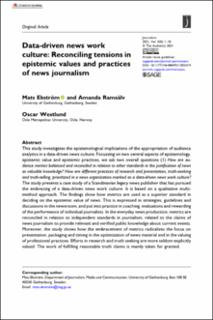Data-driven news work culture: Reconciling tensions in epistemic values and practices of news journalism
Peer reviewed, Journal article
Published version
Permanent lenke
https://hdl.handle.net/11250/2982890Utgivelsesdato
2021-12-21Metadata
Vis full innførselSamlinger
Originalversjon
Journalism - Theory, Practice & Criticism. 2021, 1-18. https://doi.org/10.1177/14648849211052419Sammendrag
This study investigates the epistemological implications of the appropriation of audience analytics in a data-driven news culture. Focussing on two central aspects of epistemology, epistemic value and epistemic practices, we ask two overall questions (1) How are audience metrics balanced and reconciled in relation to other standards in the justification of news as valuable knowledge? How are different practices of research and presentation, truth-seeking and truth-telling, prioritized in a news organization marked as a data-driven news work culture? The study presents a case study of a Scandinavian legacy news publisher that has pursued the embracing of a data-driven news work culture. It is based on a qualitative multi-method approach. The findings show how metrics are used as a superior standard in deciding on the epistemic value of news. This is expressed in strategies, guidelines and discussions in the newsroom, and put into practice in coaching, evaluations and rewarding of the performance of individual journalists. In the everyday news production, metrics are reconciled in relation to independent standards in journalism, related to the claims of news journalism to provide relevant and verified public knowledge about current events. Moreover, the study shows how the embracement of metrics radicalizes the focus on presentation, packaging and timing in the optimization of news material and in the valuing of professional practices. Efforts in research and truth seeking are more seldom explicitly valued. The work of fulfilling reasonable truth claims is mainly taken for granted.

